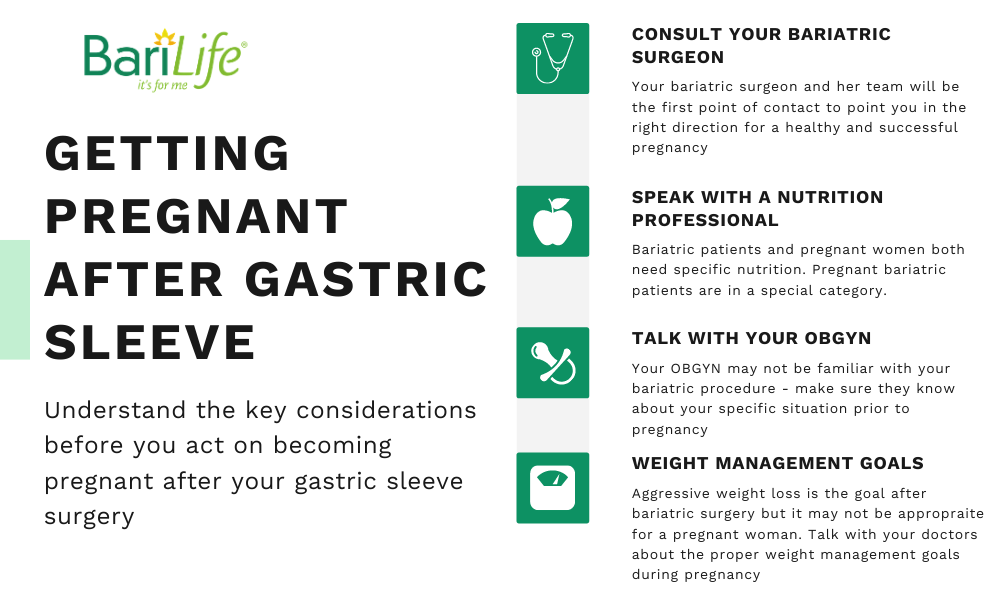ENTER YOUR EMAIL ADDRESS TO UNLOCK
15% OFF
on your first order
Some exclusions apply.
Many women may not have been able to get pregnant before their gastric sleeve surgery due to the impact that the weight had on their hormones. Hormonal issues caused by obesity can negatively impact the body’s ability to ovulate regularly, making it difficult to conceive.
It’s quite common for women who have undergone the procedure and begin losing weight to start ovulating regularly; something they may not have experienced in years.
Bariatric Surgery and PCOS A common condition that affects overweight or obese women, called polycystic ovarian syndrome (PCOS), adds to fertility issues. It is associated with higher production of testosterone and testosterone derivatives, as well as metabolic imbalances, which cause insulin and blood sugar changes.
PCOS basically means your body’s hormones are out of whack and creates a “perfect storm” for infertility.
Insulin is the major hormone involved in blood sugar regulation, and insulin resistance means your body requires higher amounts of insulin to get a response. Higher amounts of insulin affects the ability of follicle within the ovaries to grow, and it also negatively affects the ability of eggs to mature.
These metabolic and hormonal imbalances may resolve once the weight begins to come off, and so fertility is often significantly improved after bariatric surgery.
How long should I wait to get pregnant after gastric sleeve surgery? It is often recommended that women who have undergone gastric sleeve surgery wait between 1 and 1.5 years before they attempt to conceive . There’s not enough evidence to suggest that this is a ‘golden rule’; however, there is a theory behind this guidance.
The majority of weight loss after bariatric surgeries, like the gastric sleeve, occurs during the first 12-18 months. Rapid weight loss is not typically recommended during pregnancy because it increases the risk of serious complications in the developing fetus, leading to reduced birth weight and possible birth defects.
Another reason for the suggested waiting period is that symptoms of pregnancy may be similar to complications that develop after bariatric surgery.
It’s difficult to decide whether nausea and abdominal pain is caused by the pregnancy or a potential surgical complication from the gastric sleeve.
This may lead to a delay in addressing possible issues arising from the surgery.
Of course, it is no hard or fast rule. Many bodies of research have found no significant correlation between negative outcomes of pregnancies before the waiting period and after, which means it is more likely that the best time to get pregnant after gastric sleeve surgery is really based on the needs of the individual.
Women who are older, for example, or those who may need to undergo fertility treatments may wish to start family planning a lot sooner than the 1-2 year waiting period, and this is entirely possible.
Risks to consider when becoming pregnant after gastric sleeve surgery Some of the risks that have been described relating to pregnancy after gastric sleeve surgery are:
[box]
Adhesions – scar-like tissue formations that make internal organs stick together Internal hernias Reduced blood flow to the small intestine Sleeve slippage [/box]
While these complications are known to occur in only a small percentage of post-surgical patients, it is important to be aware that problems such as these can arise, and that seeking early treatment and management of them offers the best prognosis.
It is critical to note that any kind of abdominal pain, whether pregnant or not, is considered an emergency and the cause needs to be assessed by your physician.
Obesity during pregnancy can cause additional risks for the baby, and research shows that there may be a higher risk of neurological defects, congenital heart defects, or cleft palate.
Another key consideration is that most OBGYN doctors may not be specialized in the specific nuances of post-bariatric pregnancies.
For this reason, it is essential to not only speak to your bariatric surgeon about the risks related to the pregnancy, but to be prepared to have the information at hand to discuss your concerns with your OBGYN.
Nutritional needs to consider when getting pregnant after gastric sleeve surgery The absorption of key nutrients like vitamins and minerals is impaired after all bariatric surgeries, including the gastric sleeve. It’s important that patients understand how to properly supplement their diet with the right bariatric vitamins.
Key micronutrients like Vitamins A, D, E, K, B12, Iron and Calcium (just to name a few)
When you get pregnant you’re not the only one who has specific nutritional needs…now you’re taking vitamins for two!
Nutritional Guidelines for Bariatric Surgery & Pregnancy After bariatric surgery you basically have two “guidelines” that you need to consider when it comes to your vitamins:
Iron Iron is needed in greater amounts during pregnancy, as more blood is needed to supply the developing baby. Iron makes up a critical part of blood, and the demand increases to around 1,200mg during the course of the pregnancy.
In non-obese women, who haven’t undergone bariatric surgery, the World Health Organization suggests around 41.8% of the pregnant population will have iron deficiency anemia. The risk increases with obesity, where iron metabolism is altered due to a state of chronic inflammation associated with the increase in weight. Additionally, higher blood volumes in obese women contribute to higher iron demands, and so a higher likelihood of anemia.
Weight loss following bariatric surgery improves iron status, but there is still a risk of iron deficiency , especially due to reduced-calorie diets, intolerance of red meat and lower levels of stomach acid, which is needed to liberate minerals such as iron from the food.
The recommendation for iron supplementation before getting pregnant after gastric sleeve surgery is 45-130mg a day. The requirements during pregnancy have been suggested at being anywhere between 45 and 600mg a day, where the needs are based on the individual and their iron status, which should be tested regularly to account for fluctuations.
Since the range is so large for iron during pregnancy after gastric sleeve surgery you must talk about this with your bariatric surgeon as well as your OBGYN
Folic Acid & B12 Folic acid (vitamin B9) and vitamin B12 are also common deficiencies in pregnant women. Folic acid requirements increase from 50mcg (non-bariatric patients) a day to 400mcg-800mcg during pregnancy, which is similar for women who have undergone a bariatric procedure prior to becoming pregnant.
Vitamin B12 deficiency is more common in women after bariatric surgery, with around 48-53% showing too little vitamin B12 availability. The recommendation for pregnant women following bariatric sleeve surgery is between 350 and 500mcg a day when taken orally, or 1,000mcg a month when receiving vitamin B12 injections.
Vitamin D Vitamin D status in post-bariatric surgery patients who get pregnant varies greatly, and it depends on vitamin D status prior to surgery as well as the procedure itself. Vitamin D demand increases particularly in the last trimester with an increase in calcium transfer to the fetus to promote bone development.
After surgery, women should take between 3,000 and 8,000IU of vitamin D (depending on your bariatric procedure).
Vitamin D screening should be done at least every trimester during pregnancy.
And between 1,500 and 2,400mg of calcium a day (depending on your procedure).
Vitamins A, E & Selenium Deficiencies of other nutrients such as vitamin A, vitamin E and selenium have been observed in post surgery pregnancy, however, studies have not observed any adverse outcomes as a result. Supplementation with additional nutrients is recommended on an individual basis, and should be discussed with your doctor and nutritional professional.
Protein Protein is another essential compound to consider after surgery and when getting pregnant. Due to lower calorie intake and restricted absorption, protein deficiency may occur. It is commonly associated with fatigue, feeling weak, and hair falling out. At least 60g of protein per day is recommended if you’re pregnant after gastric sleeve surgery.
Weight management when you’re pregnant after gastric sleeve surgery Many women who have had weight loss surgery may struggle with the likelihood that they will gain weight during the pregnancy. Body image battles are common and even though weight gain is normal during pregnancy, it is important to follow the advice of a nutritionist or dietitian as they will help to prevent either over or undereating.
Your team of professionals will also help you to determine the amount of weight you can expect to gain during your pregnancy, which is different for each person.
The Bottom Line on Pregnancy After Gastric Sleeve Surgery Becoming pregnant after gastric sleeve surgery should be an enjoyable experience. The more information you have on hand, and the more support you seek, the better the advice you will receive.
Just remember BEFORE you get pregnant:
First, consult with your bariatric surgeon – they will know the most about your specific bariatric needs Then talk with your OBGYN doctor, tell them about your bariatric surgery. The more information they have the better because they will guide you through your pregnancy Work with your bariatric dietitian to determine your (and your baby’s) specific nutritional needs during pregnancy Strive to meet your weight management goals during pregnancy when that time comes. It is with this wealth of knowledge and support that you can rest assured that you’re doing everything you need to ensure both you and your baby are well-nourished and continue to be as healthy as possible.

